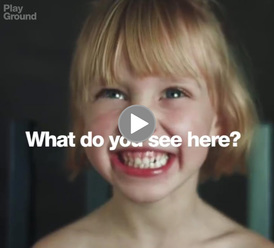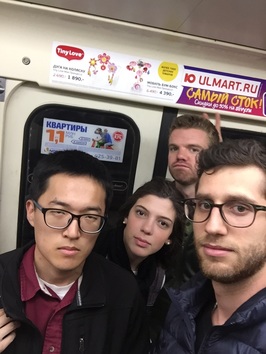Rebelling in Russia
I was 10 when someone told for the first time to stop doing something I considered my most authentic way for self-expression: to smile. She was my chemistry professor. During my childhood years, she repeatedly told me to shut my smile while in school as it disrupted the discipline she was imposing on us. I never understood why she would be telling kids to stop smiling (isn’t a child’s innocence the most precious thing?). As much as I tried to comprehend her point of view, I failed to reach a conclusion that would make me happy or at least content. Such unresolved question is still living in me today.
I find smiles (if authentic) to be one of the purest and most beautiful expressions that humans are capable of making. Smiles connect people, boost people’s energy, they increase morale. Smiles are powerful. Your smile is a statement that you are conquering that moment in time, it means that no negative force in that specific moment is greater than you. And the most amazing thing about smiles is: they are contagious.
Oh wait, is that true for everyone?
Apparently not. As we prepared to arrive to Russia, one of my biggest fears appeared again. We were told that Russians, in general, do not smile as much as people from other cultures do; or even worst, that smiling could be received as a disrespectful act in this society. In other words, the ghost of my chemistry professor appeared years after in the post-soviet environment. Was this true? What should I do now? Should I accept the Russian culture and adapt? Should I resist and stay true to myself to the extent that I can be seen as “disrespectful” to my new host?
I am aware that cultural differences can bring such implications. The way we dress, talk, behave, dance, are just the visible parts of our culture. But there are more profound things in a culture that shape who we are. With that in mind, I learned that facial expressions are not as universal as we might think. The following video shows in a snippet a conclusion that researchers from the Autonomous University of Madrid reach in regards of culture as a force that affects how we think.
I find smiles (if authentic) to be one of the purest and most beautiful expressions that humans are capable of making. Smiles connect people, boost people’s energy, they increase morale. Smiles are powerful. Your smile is a statement that you are conquering that moment in time, it means that no negative force in that specific moment is greater than you. And the most amazing thing about smiles is: they are contagious.
Oh wait, is that true for everyone?
Apparently not. As we prepared to arrive to Russia, one of my biggest fears appeared again. We were told that Russians, in general, do not smile as much as people from other cultures do; or even worst, that smiling could be received as a disrespectful act in this society. In other words, the ghost of my chemistry professor appeared years after in the post-soviet environment. Was this true? What should I do now? Should I accept the Russian culture and adapt? Should I resist and stay true to myself to the extent that I can be seen as “disrespectful” to my new host?
I am aware that cultural differences can bring such implications. The way we dress, talk, behave, dance, are just the visible parts of our culture. But there are more profound things in a culture that shape who we are. With that in mind, I learned that facial expressions are not as universal as we might think. The following video shows in a snippet a conclusion that researchers from the Autonomous University of Madrid reach in regards of culture as a force that affects how we think.
So a smile for a Russian might not represent the same as for a Peruvian like me. The research made me think that it might not be true that Russians are not generally happy. Yet, it might be the case that smiling is not the way they go about when expressing their happiness.
As we arrived to Russia, the people who welcomed us mentioned the topic again. They told us about something called “the metro face”. This term is by no means institutionalized, but it serves as a funny way to explain how people should behave in Russian public spaces. The “metro face” is simply a dull face that shows an effort to erase any sort of emotion from one's face. We learned this because we were encouraged to embrace this practice so as to evade being recognized as disrespectful tourists.
I could not bear to keep up with that “metro face” thing. As much as I tried, even for the fun of it, I could not find it appealing. I somehow felt offended by the “metro face”. My first reaction was to reject it.
So I decided to rebel.
I was not ready to feel the same powerlessness I felt during my school years. And after all, how much effort could the Russian culture impose to ban the smile from its people? Was smiling really a disrespectful thing? How do they express their happiness? I adventured myself to answer these questions because I resisted to not smile again. Just in the first week in Russia, I have already done two simple things that have helped me answer the riddle.
The first thing is a sort of social experiment. The idea was to purposefully (and authentically) smile at people at the metro stations (which by the way are beautiful). I encouraged some friends to be part of it (maybe as a way of protecting myself from this outrageous act? Who knows). The objective was to smile to a variety of individuals: from very solemn kids, to a slow old woman, to a busy working guy, and some more. Although some skeptics might say that we did not follow the steps of the scientific model, I can say with great confidence that Russians did not find our smile to be something offensive (this of course made me feel happy). Many people even shot smiles back to us.
The second thing was to just get closer to Russian people. As simple as that. As crazy as it might sound, I did not see any lack of smiles or friendliness. It was as if everything I hear about Russian being serious was a lie (or a partial-truth). Yes, there are some people here who are more serious than others, but the same I have seen in NYC, Boston, and Lima (cities that I have recently lived in). We cannot deny that people here might be colder than people in South America (not a bold generalization), or that their culture might have a different opinion in regards to smiles. But nothing implied that smiling is disrespectful in Russia, or even worst, that Russians do not smile.
In the past week I have met incredible people: friendly, hospitable, welcoming. I have met smiling beings with a Russian passport. I have even put a smile in my face as a response of a Russian smile.
Russia has made me smile.



